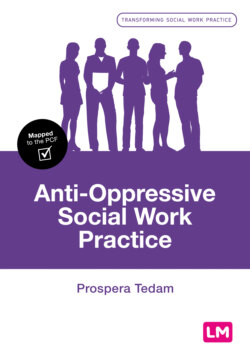Читать книгу Anti-Oppressive Social Work Practice - Prospera Tedam - Страница 9
На сайте Литреса книга снята с продажи.
Foreword
ОглавлениеWe can all think of a day, time or year where events or encounters have stayed with us. This year, 2020, will go down as one of those years in my book (as well as, I am sure, for many others) and in history books as being memorable but for the wrong reasons – notably, due to the global Covid-19 pandemic as well as the murders of Ahmaud Arbery and George Floyd in the USA.
On 23 February 2020, Ahmaud Arbery, who was out jogging in a neighbourhood, was gunned down in cold blood by a White father and son who thought he matched the description of a burglar who had recently operated in the area.
On 25 May 2020, George Floyd went into a grocery store in Minneapolis to purchase some items. Suspecting that he had paid with a counterfeit $20 note, the store owner called the police who arrived on the scene. Four officers attended the call-out and the lead officer proceeded to restrain the alleged suspect by pressing his knee into George’s neck for nearly nine minutes, resulting in his death.
Although there are many others in the USA who have died at the hands of police brutality, in both cases described above, the presence of video evidence has meant that many people around the world watched the murder of these two Black men. The videos have been heartbreakingly painful to watch, yet research by DeGue et al. (2016) suggests that in the USA, Black people constitute 32 per cent of victims who died as a result of the use of lethal force by law enforcement, despite being significantly less likely to be armed. This disproportionality in outcomes for victims of police brutality reminds us about the racial and ethnic inequalities that exist in many parts of our world, and how systems produce and reproduce oppression of people from minority groups.
This was never how I imagined I would introduce this book on anti-oppressive practice in social work, yet I am aware that by not openly challenging these gruesome acts, I am not only undermining the spirit of the contents in this book, but also complicit in oppression. I am therefore delighted that the launch of this book will be in October 2020, which is Black History Month in the UK.
For the Arbery and Floyd families, their unimaginable pain may be bearable due to the outpouring of support from people around the world and the protests to denounce the systemic racism and oppression that resulted in the murder of these two Black men. Social workers have been actively involved in different parts of the world protesting and campaigning to denounce racism and racial oppression.
The officer who pressed his knee into George Floyd’s neck is said to be the field training officer for one of the officers who attended the call with him. As a qualified practice educator and an academic with research interests in practice/field education, what is clear is that he was supposed to be modelling best practice, equipping his ‘trainee’ police officer with the knowledge and skills to work effectively with members of the public and ultimately make a judgement about the trainee’s suitability for the role. Yet, when George Floyd gaspingly uttered the words, ‘I can’t breathe’, not a single one of the four officers intervened. This complicity arising from refusing to intervene is an important lesson for us as social workers.
For social work students for whom this book is written, I would like you to reflect on the following statements as you engage with its contents. Imagine that
you are a social worker in the school where George Floyd’s children attend;
you are the social worker responsible for the community where Ahmaud Arbery lives;
you are a mental health social worker supporting the bereaved families of Covid-19.
How would you bring hope to the families and communities affected? Has your qualifying social work programme prepared you for the task? These are not easy questions to answer. However, I hope the strategies, tools and ideas presented in this book provide some direction.
